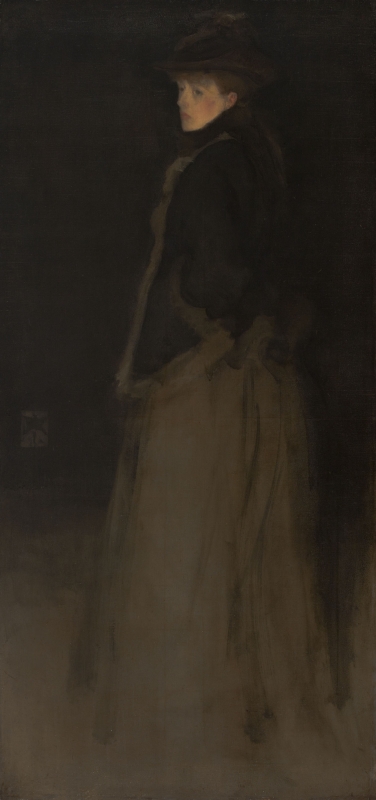Arrangement in Black and Brown: The Fur Jacket was painted, according to the Pennells, in 1876. 1
It may date from the summer or autumn of 1876, when the model, Maud Franklin (1857-1939), may have been pregnant. The jacket and skirt that she wears in the painting would have been suitable maternity wear, while also being fashionable. Although no birth certificate has been found, it is known that her daughter Ione was born on 15 October, either in 1876 or 1877. 2
The painting was shown in the first Summer Exhibition at the Grosvenor Gallery, London, in 1877, probably as 'Arrangement in Brown' (cat. no. 9). Whistler's Grosvenor exhibits were the target of an attack by John Ruskin (1819-1900), who wrote in Fors Clavigera:
'[F]or Mr. Whistler’s own sake, no less than for the protection of the purchaser, Sir Coutts Lindsay ought not to have admitted works into the gallery in which the ill-educated conceit of the artist so nearly approached the aspect of willful imposture. I have seen, and heard, much of Cockney impudence before now; but never expected to hear a coxcomb ask two hundred guineas for flinging a pot of paint in the public’s face.' 3
Whistler sued Ruskin for libel and the case was heard on 25-26 November 1878 at the Queen's Bench of the High Court of Justice. Ruskin's solicitors, Walker Martineau & Co., requested an opportunity to see all Whistler's exhibits, including two portraits, which they listed as '6. Harmony in amber and black / 7. Arrangement in brown.' They wished to produce them during the trial, and asked which were for sale. 4 Whistler's affidavit affirmed: 'At The last time when I was aware where they were Nos 1 & 7 were in the poss[essi]on of Mrs Noseda No. x Strand ... No. 6 is in my poss[essi]on but has been painted over by me since the exhibition.' 5
However, in another draft, J. A. Rose recorded that 'No. 6 is destroyed [In fact Mr Whistler has painted over it with a view to alter it & change its character as a picture[.] It is in a transition state]' 6 Another version of this affidavit, apparently quoting the artist, reads, 'No. 6 is in my possession but has been painted over by me since the Exhibition.' 7 And in yet another draft, the statement was amended to read:
'6. Harmony in Amber and Black
No. 6 destroyed by Mr Whistler since the Exhibition
... 7. Arrangement in Brown
No. 7. This Picture was not priced or for sale at the Exhibition at the Grosvenor Gallery - It is now in the hands of Mrs Noseda in pledge for advances but no doubt she would allow inspection & produce or allow the Picture to be produced at the trial.' 8
There are several accounts and transcripts of the trial proceedings. Regarding the portraits, Whistler said in court:
'Harmony in amber & black, a picture portrait of a young lady, This was not for sale, and it was in the Catalogue, I did not offer it for sale - Arrangement in brown, a similar one to the last mentioned - Harmony in amber & black, it was used & painted over - Arrangement in brown, I believe is here in the Court.' 9
Notes:
1: Pennell 1908 [more] , vol. 1, p. 201. YMSM 1980 [more] (cat. no. 181).
3: Ruskin 1877 [more] ; this excerpt was quoted in the writ issued by J. A. Rose, 21 November 1877, GUW #11948. The 'pot of paint' is assumed to refer to Nocturne in Black and Gold: The Falling Rocket [YMSM 170].
4: 28 October 1878, GUW #12096, and R. L. Fullford to J. A. Rose, 5 November 1878, GUW #11960.
5: 6 November 1878, GUW #08966.
6: J. A. Rose to Walker Martineau, [6 November 1878], GUW #12065.
7: J. A. Rose to Walker Martineau & Co., 6 and 16 November 1878, GUW #13279.
8: J. A. Rose to Walker Martineau & Co., [6 November 1878], GUW #12066.
9: High Court of Justice to J. A. Rose, 25 November 1878, GUW #11991.
Last updated: 4th June 2021 by Margaret






